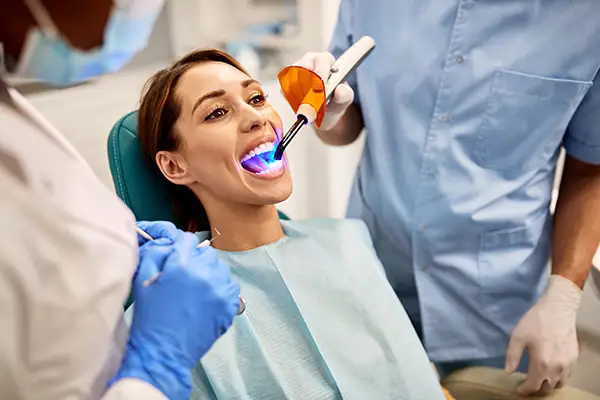Dental Bonding Dental bonding can repair teeth that are chipped, cracked, or discolored. The procedure involves the application and bonding of a resin material to the damaged tooth. A special light hardens the resin and the treatment is complete. Bonding takes less time than getting crowns or veneers and is generally more cost-effective. If you want to know more about dental bonding, our team at Rolling Plains Dentistry is here to answer all of your questions. Dental bonding can repair teeth that are chipped, cracked, or discolored. The procedure involves the application and bonding of a resin material to the damaged tooth. A special light hardens the resin and the treatment is complete. Bonding takes less time than getting crowns or veneers and is generally more cost-effective. If you want to know more about dental bonding, our team at Rolling Plains Dentistry is here to answer all of your questions.How Does Dental Bonding Work?Bonding works by applying a strong resin composite to the area of your tooth that is damaged and then hardening it and shaping it so it looks like part of your natural tooth. First, we match the resin color to the color of your teeth. Then we roughen the surface of the tooth and apply a liquid gel where the bonding will be placed. The gel helps the resin to stick to your tooth. After the resin is placed on your tooth, it is shaped to match your tooth and then hardened with a special light. The final step is to check the shaping and polish the bonded area of your tooth so it matches the rest of your smile. The entire process takes about 30 to 60 minutes to complete and can be done in a single appointment. No special care is required after dental bonding, but you should stay away from coffee and other drinks that may stain your teeth for the first few days after the procedure. Dental bonding typically lasts three to 10 years, so it is important to schedule regular dental appointments and cleanings to have your bonding checked and replaced when needed. If you notice lifted or sharp corners on your bonding, or if your bite feels different than normal, it may be time to have your bonding replaced. Benefits of Dental BondingDental bonding is a simple and painless procedure that does not require anesthesia. It can fix imperfections in your teeth and can be completed during the course of one appointment. Dental bonding is less expensive than getting crowns or veneers, and bonding breaks less often than crowns or veneers do. It also requires less enamel to be removed from your teeth than crowns and veneers do. Dental bonding can make your teeth look longer or change the shape of your teeth, so you might consider it if that is something you hope to achieve with cosmetic dentistry. Who Is a Good Candidate for Dental Bonding?Dental bonding is a good choice to fix discolored teeth that cannot be repaired with teeth whitening. You might also consider dental bonding as a solution to fix decayed teeth or fill in gaps between your teeth. It is best used when the damage to your tooth is not too severe. Bonding is sometimes used to protect the root of a tooth when the gumline has receded and exposed the root. You might not be a good candidate for dental bonding if you eat or drink a lot of foods that can stain your teeth. If you think dental bonding might be the right choice for you, we can help you learn about your options. Give us a call at 940-663-5353 and book your appointment today. |